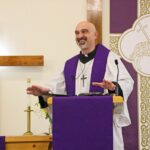Psalm 80:7–19
7Restore us, O God of hosts;
let your face shine, that we may be saved!
8You brought a vine out of Egypt;
you drove out the nations and planted it.
9You cleared the ground for it;
it took deep root and filled the land.
10The mountains were covered with its shade,
the mighty cedars with its branches.
11It sent out its branches to the sea
and its shoots to the River.
12Why then have you broken down its walls,
so that all who pass along the way pluck its fruit?
13The boar from the forest ravages it,
and all that move in the field feed on it.
14Turn again, O God of hosts!
Look down from heaven, and see; have regard for this vine,
15the stock that your right hand planted,
and for the son whom you made strong for yourself.
16They have burned it with fire; they have cut it down;
may they perish at the rebuke of your face!
17But let your hand be on the man of your right hand,
the son of man whom you have made strong for yourself!
18Then we shall not turn back from you;
give us life, and we will call upon your name!
19Restore us, O Lord God of hosts!
let your face shine, that we may be saved!
Turn us to You, O God
Psalm 80 appears to have been written after the fall of the Northern Kingdom (Israel) in 721 BC. After the reign of Solomon, the kingdom of was divided into north (Israel) and south (Judah). The northern kingdom was continuously rebellious and had a continuous string of ungodly kings who continued to lead the people astray.
As often happens in our own lives, the circumstances around us can wake us up to realities of problems in our own lives that we might have previously ignored or to which we had previously been blind. The fall of Israel caused the Psalmist to consider that many of the problems that led to the downfall of the northern kingdom were also present in the southern kingdom.
Idolatry, exploitation of the poor, and sexual sins were all reasons God brought about the destruction of the northern kingdom and now the psalm writer, confronted with the terrible consequences of sin, is praying that God would keep the southern kingdom from similar devastation.
The Psalmists prays, “Restore us,” (v. 7) “Turn again,” (v. 14) and “Restore us” (v. 19). Now what’s interesting is that what is translated as “restore” and “turn” both come from the same Hebrew root word: שׁוּב (shoob).
The word shoob generally means “to return.” In verse 7 the psalmist is praying “cause us to turn.” “Restore us” is a fitting translation as well, but the Hebrew grammar indicates that the psalmist is asking God to turn them so that they can be restored again.
In verses 7 and 19 the prayer is for God to turn the people back to Him, but in verse 14 the prayer is that God would return to them.
This really becomes a beautiful prayer within a prayer:
Turn us to You, O God
O God, turn to us
Turn us to You, O God
Now take a moment to consider who is running the verbs here…that is to say, who is doing the action.
Who us doing the turning? God is!
God is the one who turns us back to Him and God is the one who turns to us in order to rescue us!
Now, we have to consider what our response will be when God comes to us to turn us from our sinful ways. God came to the people of the northern kingdom repeatedly through prophets, but they rejected the voice of the prophets and refused to be turned. The people of the southern kingdom sometimes heeded the words of the prophets and were turned back to the Lord, but sometimes they rejected the Lord and His prophets in order to continue doing what they wanted to do.
Now, as we read in today’s gospel reading, God sends His own Son to His people, yet even God’s own Son was rejected.
Today God turns to you, He comes to you in order to turn you from sinful ways to His ways. Will you allow Him to bring you to repentance?
Questions for consideration
Why might the Psalmist have prayed that God turn the people rather than praying that the people do the turning?
What are some reasons people reject God when He seeks to turn them from sin to His ways?
When the Lord speaks to you through His Word and the message isn’t one you want to hear, how do you respond?












0 Comments